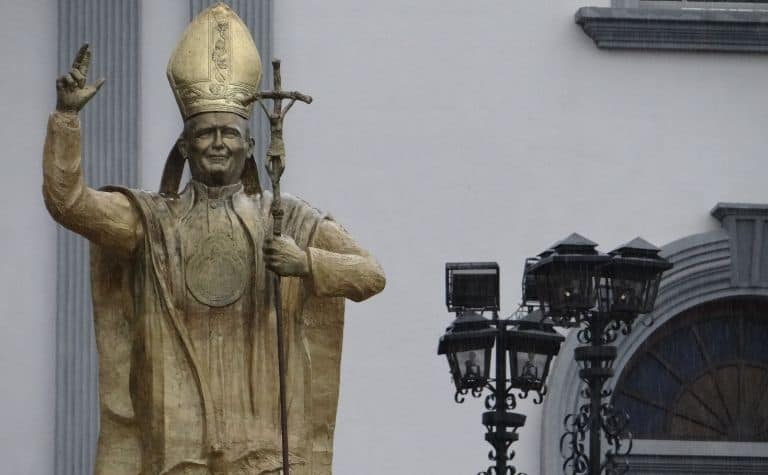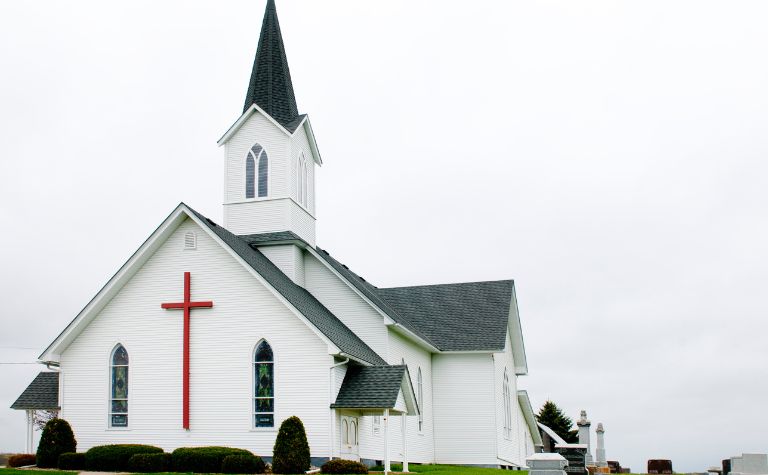Unlike Catholics, Protestants don’t believe that the Pope is the head of the Roman Catholic Church, the successor of Peter, or the Vicar of Christ on Earth. While Protestants agree with the Pope on certain doctrines (e.g., the Trinity) and support him on various issues (e.g., caring for the poor), they don’t recognize his authority.
Protestants believe that the Bible alone is authoritative for the Church and for Christian living. Protestants don’t agree with the Catholic church’s interpretation of important passages in the Gospels, which provide the foundation of their beliefs about papal authority and apostolic succession.
What do Protestants think about the Pope? What is their biblical basis for rejecting his authority? What does the Catholic Church teach about the Pope? What did Martin Luther, a key figure in the Protestant Reformation, believe about the Pope? Keep reading to learn more.

What Do Protestants Think of the Pope?
Protestants believe that the Catholic church’s beliefs about the office of the Pope are based on a misunderstanding of Jesus’ teachings in the Gospels.
According to this view, the Catholic church’s teaching about the Pope takes verses and passages out of context. (Also see Do Protestants Have Confession?)
What is at the heart of the disagreement? The Catholic church teaches that the Pope is the spiritual head of the church, a view sometimes referred to as the “primacy of the Pope,” while Protestants believe that Scripture alone is authoritative for Christians.
Protestants don’t believe that the Bible teaches that the Pope is the church’s earthly head, Peter’s successor, or the Vicar of Christ. (Also, see Do Protestants Use Crucifixes?)
Do all Protestants believe the Pope is the antichrist? No. Some Protestants, even Martin Luther (see below) have made unbecoming statements about the Pope. One of the most extreme views is that he (i.e., whoever is in office at the time) is the antichrist.
Most Protestants disagree with that view. In fact, certain Popes — like Pope John Paul II — have a very good reputation among Protestants, even though they take their theological differences seriously. (Also, see Why Did Protestants Leave the Catholic Church?)
Do Protestants disagree with the Pope on all matters? No. Protestants agree with the Pope’s stance and support his work on issues like caring for the poor and providing alternatives to abortion for unexpectedly pregnant women.
There are numerous examples of Protestant denominations and churches with the Pope and the Catholic church on issues that are important to both of them.
How do Catholics and Protestants view Scripture differently on this matter? The history of interpretation of relevant passages in the Gospels on this matter and their applications can fill a library.
Below is a simple summary of the core issue regarding two of the most significant passages in the debate: John 20:22-23 and Matthew 16:19.
“And when He had said this, He breathed on them and said to them, Receive the Holy Spirit. If you forgive the sins of any, their sins have been forgiven them; if you retain the sins of any, they have been retained.'” John 20:22-23 (ESV)
“I will give you the keys of the kingdom of heaven, and whatever you bind on earth shall be bound in heaven, and whatever you loose on earth shall be loosed in heaven.” ~ Matthew 16:19 (ESV)
In these passages, Jesus gives his followers the power to forgive and retain sin. The heart of the disagreement is this question: do Jesus’ words apply to only the apostles or to all believers?
How do Protestants interpret these verses? Protestants believe these instructions are given to all believers. They point out that nothing in the passage suggests that Jesus only gave these abilities and responsibilities to people who held a certain office in the church. Jesus gave Peter these abilities, but he also gave them to everyone else, according to this view (e.g., Matt. 18:18).
How does the Catholic Church interpret these verses? The Catholic church teaches that the instruction was only for the apostles and for their true successors, who are recognized through the Catholic church’s ordination process. In these passages, Jesus is transferring power to the Apostles. (Also see Why Do Protestants Worship on Sundays?)
What do Protestants say about other New Testament passages? Protestants emphasize that Jesus gave similar instructions to all believers in the Great Commission (Matt. 28:19-20) and that people who weren’t apostles preached the gospel, including the forgiveness that comes with it, in the book of Acts (e.g., Acts 6:5, 8:1-12, 13:38).
What does the Catholic church say about early Christian literature? Catholic historians and theologians argue that their view is evident in writings from early church fathers like Clement of Rome, Ignatius of Antioch, and Tertullian, who wrote about penance and the forgiveness of sin. (Also, see Why Don’t Protestants Make the Sign of the Cross?)

What Do Catholics Believe About the Pope?
Catholics believe that the Pope is the God-appointed leader of the church and the successor to Peter. The Pope’s power is connected to the Catholic belief that Jesus gave the Church the authority and ability to properly interpret the pages of Scripture.
These interpretations carry just as much authority as the Bible itself. According to Catholic theology, the Bible and the church both flow from the same source: God himself, and thus Christians should treat both of them with equal reverence and authority. (Also, see Do Catholics Believe Protestants Go to Heaven?)
Throughout much of its history, the Catholic Church has treated the Pope’s pronouncements as authoritative. However, it wasn’t until Vatican I in 1870 that the Church laid out the doctrine of papal infallibility in detail.
The Church made it clear that not everything the Pope said or did was incapable of error. Further, not even everything the Pope said concerning the church and theology was infallible. The Pope is only infallible when he speaks “ex-cathedra.”
For the pronouncements of the Pope to be infallible, they must meet a specific set of parameters. Accordingly, the Pope should be very explicit and clear when he wishes to speak in this manner.
This sort of pronouncement is rare. Pope Benedict XVI in 2005 said that “the Pope is not an oracle” and is only “infallible in very rare situations.” [2]

What Did Martin Luther Believe About the Pope?
Luther’s views on the Pope changed considerably throughout his life. By the time of his death, he and many others considered the Pope to be the antichrist. This particular belief did not stand the test of time, but his earlier musings certainly did.
Luther’s fundamental objection to the Pope’s authority originates in the belief that church leaders should constantly be re-examining Scripture to know what to believe and how to act. (Also, see Protestants vs. Lutherans: What’s the Difference?)
When Luther wrote his famous 95 Theses, he did not write it, intending it to be a charter for Protestantism. Rather, he wrote it as a call for a discussion with other academics and church leaders.
The particular nature of Luther’s theological objections to the practice and theology of the church was not the most important part of Luther’s 95 Theses.
Rather, it was the assertion that the church and the Pope were wrong about certain things. This indeed was a revolutionary idea and was at odds with core Catholic theological understandings.
At the end of his 95 Theses, Luther calls for Christians to imitate Christ in his service to others and the gospel. Every Christian has an obligation to live a life of repentance, and the papal idea of purchasing indulgences does not fit well into this vision of the Christian life.
The idea that an individual can repent daily before God, without the assistance of the Pope and other church authorities, flows naturally into Luther’s later idea that individuals require no other intermediary besides Christ.
It is accurate to say that early on, Luther did not reject the authority of the Pope per se. Rather, he was saying that the Catholic Church has less bearing on the individual than it claims to have. [3]
References:
[1] Source
[2] Source
[3] Source
[4] Source
[5] Source
Related Questions
Catholic vs. Protestant vs. Orthodox: What's the Difference?
Roman Catholicism, Protestant Christianity, and the Eastern Orthodox Church are the three historical branches of the Christian religion. Each tradition traces its doctrines and practices to the New...
Protestantism and Anglicanism are branches of the Christian faith that have roots in Europe. Protestantism and Anglicanism have similarities and differences with each other as well as other...
